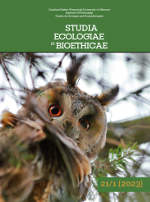Urban Green Spaces in Brazil: Challenges and Opportunities in the Context of the COVID-19 Pandemic
Urban Green Spaces in Brazil: Challenges and Opportunities in the Context of the COVID-19 Pandemic
Author(s): Raquel Souza Silva, Claudia Lins Lima, Sterling D. Quinn, Aneta Afelt, Anne-Elisabeth Laques, Carlos Hiroo SaitoSubject(s): Energy and Environmental Studies, Environmental Geography, Environmental and Energy policy, Human Ecology
Published by: Wydawnictwo Naukowe Uniwersytetu Kardynała Stefana Wyszyńskiego w Warszawie
Keywords: green spaces;social justice;sustainable transition;pandemic;One health;SDG 11;Brazil;urban green space;human well-being
Summary/Abstract: During the COVID-19 pandemic, urban green spaces were considered less prone to contagion, and thus people adopted them as alternative sites for improving mental health. The One Health concept advocated by health organizations worldwide supports the idea that the well-being of urban residents is strongly linked with physical activity in green areas. As the world grapples with the physical and mental health consequences of the COVID-19 pandemic, it becomes clearer that access to urban green spaces is a human rights issue. This study compared previously-mapped urban green spaces in five metropolitan regions in Brazil with the results of an extensive survey of municipal managers concerning possible increase in demand of population for green spaces. Urban green spaces of over 625 m2 were mapped in 117 municipalities, the total area of 4170 km2 representing 37.4% of the urban spaces analyzed in the five metropolitan regions. Out of these 117 municipalities, 49 had data available concerning demands of green spaces in the pandemic context. Overall, 20 municipalities (representing all five metropolitan regions) stated that there was an increase in visitation in urban green spaces, and 13 more indirectly suggested possible demands. When sustainability transitions are understood as geographical processes that happen in concrete places, urban green spaces then represent real locations where sustainable transitions can begin. The unequal distribution of these spaces also brings into consideration a social justice perspective, as well as aspects of public health that involve climate change resilience and epidemiological risk (SDG 11).
Journal: Studia Ecologiae et Bioethicae
- Issue Year: 21/2023
- Issue No: 1
- Page Range: 69-88
- Page Count: 20
- Language: English

